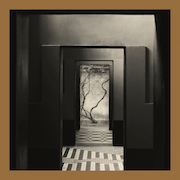As digital technology and the internet open up new methods of instant communication across vast distances, it has allowed artists with common interests but separated by miles of ocean and land to collaborate with an ease that would stagger the likes of Throbbing Gristle or William Burroughs, who had to resort to postcards and letters to work together back in the late 70s and early 80s. If these technologies make overseas cooperation easier however, the onus is on the artists to make sure what results remains coherent and homogenous and not just a grab-bag of every idea in their heads. Too often this isn’t the case, but Yair Elazar Glotman and Mats Erlandsson’s Negative Chambers is a superb example of how it can work, with the pair based in Berlin and Stockholm respectively.
Reflective of this are the album credits, with Glotman and Erlandsson credited with all instruments equally. It’s an impressive array taking in gimbri, Tibetan singing bowls, various percussion and string instruments, guitars and zithers and even a transistor radio and “amplified plate”, yet at no point do any of the tracks on Negative Chambers feel cluttered or overly busy. Instead, the duo tailors these instruments towards a common atmospheric goal on each composition. As evidenced by the austere monochrome artwork, Negative Chambers is a stark and bleak album, and one that gains its power from the economical deployment of the array of instruments.
‘Cornelian Cities’ opens the album with a minor-chord thud as a gentle but ominous acoustic guitar line is traced over a tapestry of elusive sound effects. The cities evoked by the title appear in the mind’s eye as desolate urban dystopias, perhaps bereft of life and shrouded in fog and rain. I don’t know if Yair Elazar Glotman and Mats Erlandsson are fans of Hungarian master film director Béla Tarr, but their music would make a fitting soundtrack to one of his black-and-white masterpieces. Like Tarr, however, this is not bleakness for bleakness’s sake: as ‘Cornelian Cities’ progresses, the duo introduces percussion and tempo, ratcheting up the underlying rhythmic propulsion of the track. ‘Orchid Sedation’ pursues the taut atmosphere of ‘Cornelian Cities’, with a brooding harmonium drone throughout and chiming interjections on cymbals and aching sweeps of strings and singing bowls. From austere means, Glotman and Erlandsson conjure up sweeping, panoramic sonic vistas in which intricate details are revealed slowly. The guitar pattern on ‘Ceramic Relic’, for example, echoes that on ‘Cornelian Cities’, but listen closer and the delicate violin swirls underneath reveal an even deeper sense of melancholy.
With its elaborate temporal and structural builds and swells, in some ways Negative Chambers feels less like a drone album and more like the reasonable conclusion of the idiomatic trajectory first outlined by bands like Talk Talk and Bark Psychosis in the early- to mid-90s. It’s certainly not post-rock as one might understand it today, but Glotman and Erlandsson share those bands’ meticulous attention to detail and an overall concern for atmosphere more than anything else. Negative Chambers travels down some dark corridors as it winds its way through the labyrinth its creators set up, but as the final swell fades into quietness, the result feels somehow triumphant.


